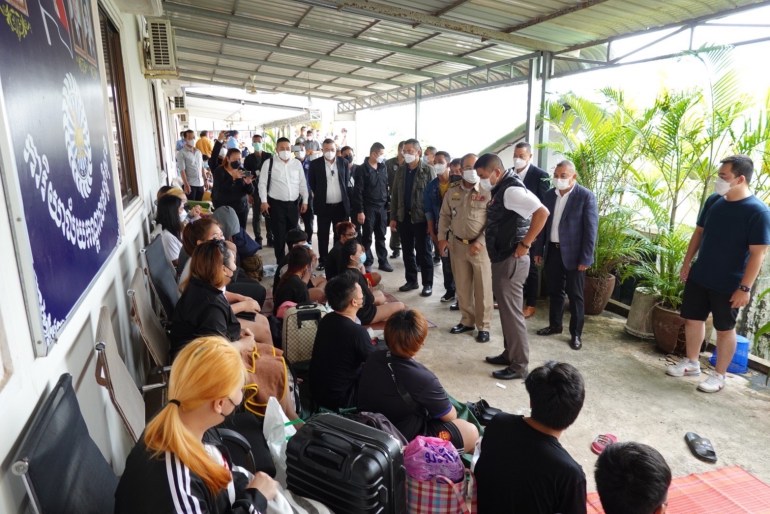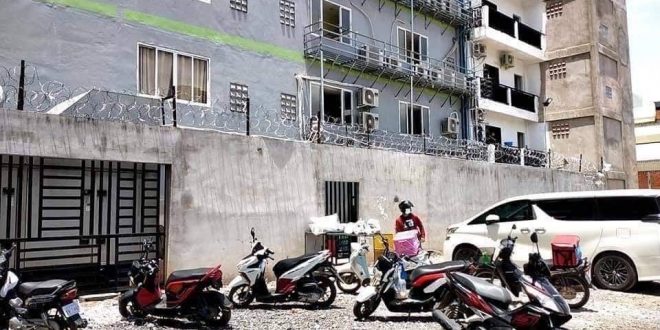Bangkok, Thailand – The brokers arrived with promises of high-paying online sales jobs in Poipet, a Cambodian border town just an hour’s drive from Teerapat and Dao’s home in eastern Thailand.
After more than two years of pandemic-induced poverty, Teerapat and Dao were willing to take virtually any work away from their remote, rural village.
But by the next day, the couple began to realise they had made a terrible mistake.
After being driven deep across the border to the crime-ridden Cambodian beach town of Sihanoukville, Teerapat and Dao allege that they were ordered to stay inside a guarded 12-storey compound where Chinese “bosses” laid out their instructions via an interpreter.
Their “job” quickly revealed itself as a scam, according to interviews with the pair and corroborating police information.
Instead of online sales, Teerapat and Dao say they were directed to make unsolicited phone calls posing as customs officers, policemen or potential investors looking to secure a bank transfer.
The couple allege they were each expected to scam at least 500,000 baht ($15,000) every month along with dozens of others at the compound, all the while facing the threat of being sold to another gang if they failed to make the numbers.
“I normally don’t trust people easily,” Teerapat told Al Jazeera, speaking under an alias for fear of reprisals.
“But we were both desperate for money so when the broker said we could make up to $2,000 a month – with everything paid for, transport and room and board – we were convinced.”
“Had I known that my job was to scam other Thais, I would have never gone,” Teerapat added.
Thai police say there could be more than 1500 Thais trapped in Sihanoukville, held against their will by the scam gangs.
Two dozen of them were rescued on Sunday from a 10-storey townhouse sealed behind razor wire and covered by security cameras, according to Thai authorities, following a long negotiation between Thai police who travelled to Cambodia and a group of Chinese men.

“With our Cambodian counterparts we have managed to rescue 700 Thais in total so far,” Lieutenant General Surachate Hakparn, a senior Thai police officer, said in a statement. “We’ve issued human trafficking warrants for international organised gangs as well as prosecuted brokers who smuggled Thais through illegal border crossings into Cambodia.”
Media reports from across Southeast Asia allege hundreds of Malaysians, Filipinos and Indonesians have also been lured to Cambodia by organised crime groups based in and around Sihanoukville, a city notorious for its lawless reputation, casinos and Chinese criminal gangs.
In Thailand, it is normal for brokers to travel between poor villages offering locals jobs, especially once the harvest is over and underemployment is rife.
Many farmers seek their fortunes in better-paying jobs, sometimes overseas. But others end up working on fishing boats and factories operated by criminal syndicates that pay little – or even nothing at all.
Phone scam gangs are relative newcomers to the game.
“Most of the kingpins are in China but they employ people all the way down the line in neighbouring countries,” Police Colonel Krissana Pattanacharoen, a spokesman for the Royal Thai Police, told Al Jazeera.
About 700 Thais have been repatriated so far from Cambodia, a majority of whom were forced into debt bondage with price tags of several thousand dollars on their freedom, according to the police.
“When the Thai recruits learn that their job is to scam their fellow Thais, they don’t want to do it any more,” Krissana said. “But they can’t leave so they have to keep working for the gang.”
Authorities say the fraud has been carried out on an industrial scale, scamming Thais out of millions of dollars since the pandemic began.
Teerapat and Dao say they escaped after 10 days. After Dao tested positive for COVID-19, her rattled captors allowed Teerapat to ring around his village to borrow the $3,000 “fee” for their release to seek medical help outside the compound.
“Everyone wants to leave,” Dao said. “But most can’t find enough money to pay off their bondage.”
“My dad had to borrow money to get us back, now we’re all in a lot of debt and we’re still unemployed.”
Fateful phone call
Mon, 37, can remember the exact date and time it was – 11am, January 24 – when she picked up the phone call that would ruin her life.
The man on the line said he was calling from the headquarters of Thailand Post and had received a complaint from police in Bang Lamung, Chonburi, that a suspected money launderer had been caught with five ATM cards, three bank account passbooks and nine passports in her name. He told a panicked Mon the call would be transferred to the police station handling the case.
Another man who identified himself as a superintendent at Bang Lamung station – whose name Mon confirmed with an internet search – then told her it was standard procedure to make a transfer into a police account to prove she was not linked to the money launderer. The money would be returned a few hours later, she was told.
“So I transferred all of my money … around 200,000 baht,” Mon told Al Jazeera.
The money was never returned. Mon was just one of the seven people in Phuket who had been scammed that week, one of whom transferred 400,000 baht (nearly $12,000).
“I won’t get my money back but I want these scammers to face justice,” Mon said. “I take care of my parents and child. I’ve got bills, car payments every month … now I have to take out loans and do extra work.”
At about the same time that Mon was targeted, Teerapat and Dao were being recruited as participants in a scam network in Sihanoukville some 1,500km (932 miles) away.
Teerapat and Dao say they never learned the names of their two Chinese bosses, or the Chinese interpreters who issued their instructions in Thai and eavesdropped on phone calls to make sure they stuck to the script.

The couple say the call centre was split into three “lines” totalling 120 people. The first group was tasked with digging through the internet for contacts to call, collecting Thai ID numbers, bank balances, addresses, and account details to put together a convincing scam.
The second line – theirs – was in charge of posing as customs officers or postal workers to make the first call and set the bait for the scam. The third group were the “closers” who would impersonate police officers to persuade the victims into transferring the money.
“The company makes around 10 million baht ($300,000) a day,” Teerapat said.
“They scam thousands of Thais each day and these guys own four different branches of this call centre in Cambodia,” Dao said.
Police officials say many victims never come forward, while the proceeds of the scams are well hidden, including through the use of cryptocurrencies.
As soon as a scam is exhausted, gangs will invent another one to take its place, said Kridsana, the police spokesman.
“These scam gangs are like mushrooms … new heads keep popping up with different colours and shades,” he said.
Meanwhile, Chinese authorities pay little attention to crimes committed far from their shores that do not target their nationals, Krissana added.
In debt and out of work but back home, Dao is grateful she and her husband made it back to Thailand at the start of February.
“But I still have dreams about sitting in that room, the phone keeps ringing,” she said.
For Mon, the biggest cost has been the persistent anxiety and damaged self-esteem.
“People ask ‘why would you believe them?’” she said. “I tell them you can never understand until it happens to you.”
 Top Naija News: Nigerian News, Breaking News Nigeria and World News Top Naija News is a daily news publication in Nigeria, delivering the latest breaking news in Nigeria and around the world.
Top Naija News: Nigerian News, Breaking News Nigeria and World News Top Naija News is a daily news publication in Nigeria, delivering the latest breaking news in Nigeria and around the world.




